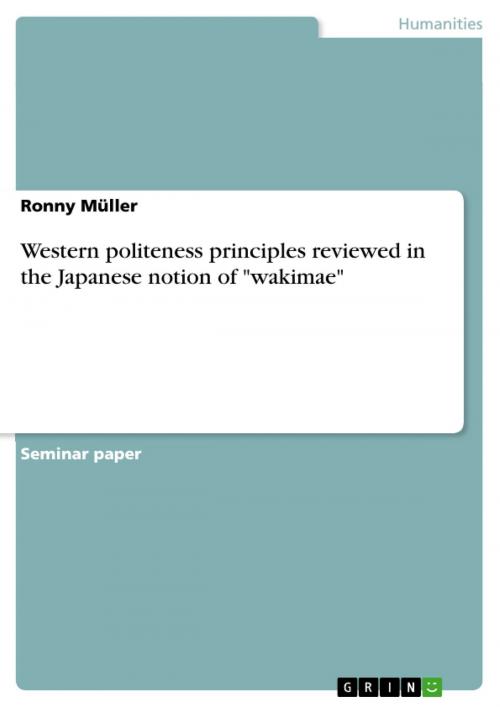Western politeness principles reviewed in the Japanese notion of 'wakimae'
Nonfiction, Reference & Language, Language Arts, Communication| Author: | Ronny Müller | ISBN: | 9783656841715 |
| Publisher: | GRIN Verlag | Publication: | November 18, 2014 |
| Imprint: | GRIN Verlag | Language: | English |
| Author: | Ronny Müller |
| ISBN: | 9783656841715 |
| Publisher: | GRIN Verlag |
| Publication: | November 18, 2014 |
| Imprint: | GRIN Verlag |
| Language: | English |
Seminar paper from the year 2014 in the subject Sociology - Communication, grade: 1,7, University of Erfurt, language: English, abstract: Considering the term 'polite' seems to be straightforward in our way of thinking today. However, to get to the bottom of politeness is not as easy as it appears at a first glance. The topic by itself and the principles beyond politeness are quite complex. To determine a general definition of politeness is desperately sophisticated. Politeness includes a great amount of subareas and distinct characteristics among a broad range of countries and cultures. Given these points, Watts distinguished politeness research with 'being in combat with a many-headed hydra'. Watts was on solid ground. Once you have separated one head of this hydra, all the more heads climb up instead. First of all, the spectator has to observe politeness research across-the-board. This fact by itself faces a huge and difficult challenge. Especially, if the observer keeps a close eye on issues related to politeness research. One of these subjects is the use of honorific forms in Western and Eastern societies. One conception beyond the usage of honorific forms was established by the Japanese sociolinguist Sashiko Ide (1989), who adjudicated the Japanese notion of wakimae as a conceptualization to define the usage of honorific forms across cultures. The aim of this paper is to challenge the applicability of wakimae with reference to Western politeness principles. The first head of the hydra that has to be controlled deals with Western politeness principles. A brief glimpse of politeness research is provided because it is essential for the understanding of politeness research and Ide's conception of wakimae. Current conceptions are predominantly based on these previous theories, labeled as first-wave approaches. Among first-wave approaches, the conception of Brown and Levinson was the most influential work in the field of politeness research. Correspondingly to first-wave approaches, a further head of the hydra appears in the field, the so called second-wave approach to politeness. After the clarification of first- and second-wave approaches, the conceptualization beyond East Asian and Japanese politeness enters the limelight. Another occurring and important head of the hydra is the notion of wakimae by itself. The end of this paper and the last head of the hydra are represented through a critical reflection of the Japanese notion of wakimae.
Seminar paper from the year 2014 in the subject Sociology - Communication, grade: 1,7, University of Erfurt, language: English, abstract: Considering the term 'polite' seems to be straightforward in our way of thinking today. However, to get to the bottom of politeness is not as easy as it appears at a first glance. The topic by itself and the principles beyond politeness are quite complex. To determine a general definition of politeness is desperately sophisticated. Politeness includes a great amount of subareas and distinct characteristics among a broad range of countries and cultures. Given these points, Watts distinguished politeness research with 'being in combat with a many-headed hydra'. Watts was on solid ground. Once you have separated one head of this hydra, all the more heads climb up instead. First of all, the spectator has to observe politeness research across-the-board. This fact by itself faces a huge and difficult challenge. Especially, if the observer keeps a close eye on issues related to politeness research. One of these subjects is the use of honorific forms in Western and Eastern societies. One conception beyond the usage of honorific forms was established by the Japanese sociolinguist Sashiko Ide (1989), who adjudicated the Japanese notion of wakimae as a conceptualization to define the usage of honorific forms across cultures. The aim of this paper is to challenge the applicability of wakimae with reference to Western politeness principles. The first head of the hydra that has to be controlled deals with Western politeness principles. A brief glimpse of politeness research is provided because it is essential for the understanding of politeness research and Ide's conception of wakimae. Current conceptions are predominantly based on these previous theories, labeled as first-wave approaches. Among first-wave approaches, the conception of Brown and Levinson was the most influential work in the field of politeness research. Correspondingly to first-wave approaches, a further head of the hydra appears in the field, the so called second-wave approach to politeness. After the clarification of first- and second-wave approaches, the conceptualization beyond East Asian and Japanese politeness enters the limelight. Another occurring and important head of the hydra is the notion of wakimae by itself. The end of this paper and the last head of the hydra are represented through a critical reflection of the Japanese notion of wakimae.















